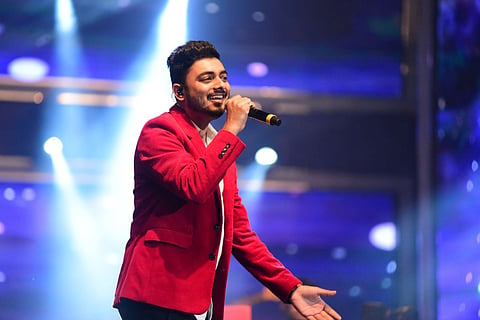Playback singer Abhay Jodhpurkar talks Hai Junoon!, AR Rahman, independent tracks, and live shows
Playback singer Abhay Jodh-purkar, who rose to fame with the soulful Moongil Thottam from Mani Ratnam’s Kadal, has had an impressive run this year with Hai Junoon!—a web series that features not one, but nine songs sung by him. In a candid conversation, Abhay shares how the project came to be, the creative process behind it, and his thoughts on the evolving music industry.
Abhay Jodhpurkar on singing 9 songs for Hai Junoon! and working with AR Rahman again
How did Hai Junoon! come about?
About a year ago, I was approached by Sagar, who is the creative head behind Hai Junoon!. He explained the concept of the series, which is a unique blend of storytelling and music, trying something new while staying rooted in Indian music and Bollywood classics.
The idea was to have a mix of original compositions and recreations of beloved songs. I was brought on to be the singing voice of one of the lead characters, played by Siddharth Nigam, who heads Supersonics. What excited me most was that I hadn’t sung for a character in a web series before, and this project offered a rare opportunity to explore that format.
Once I came on board, we delved into the character’s arc, understanding his emotional and musical journey. That influenced how I rendered each song, whether it was showcasing immaturity during auditions or the gimmicks he does in Mere Angne Mai. Singing nine songs for one series is quite rare, and it was a creatively fulfilling experience, especially working with different composers.
Several songs in Hai Junoon! are recreations, like Mere Angne Mein. Was there pressure to match the originals?
There wasn’t pressure in that sense, because our goal was never to replicate. When you recreate a classic, you’re not trying to outdo the original; you’re giving it a fresh interpretation. We made sure to retain the essence and emotion of the original while adding our own creative touch.
For instance, with Mere Angne Mein, we were careful to make the lyrics and arrangement relevant to today’s context while remaining respectful to its legacy. I think we succeeded in doing justice to the spirit of the song without diluting its value.
You’ve also been active in Marathi cinema lately. How has that been?
It’s been fun! Marathi is my mother tongue, so singing in the language feels very natural. It’s creatively satisfying and something I’m grateful for.
You began your journey with AR Rahman. What lessons from him do you still carry with you?
Every session with Rahman sir is a masterclass. One of the most valuable lessons he taught me is the importance of originality. He always emphasised being authentic in what you bring to the table, bringing your unique voice and expression to a song, rather than imitating others, because it won’t do justice to the track.
He also instilled in me the importance of constant growth. I’ve tried to keep that mindset, listening to diverse genres, learning, reinventing, and reimagining how I could have done it better. Music is an endless ocean; the deeper you dive, the more you realise there’s always room to improve.
I’ve also recently recorded something new with him. I can’t reveal details just yet, but I’m very excited for people to hear it.
Having been a playback singer for almost a decade, how do you see the industry evolving?
The biggest shift I’ve noticed came after the lockdown. With the rise of OTT platforms, there’s now a broader canvas for music, more opportunities and creative freedom. Also, Indian music is finding its place globally, becoming more universal. You can now record professional-quality vocals from a home studio and send them across the world. That flexibility is a huge boon.
However, one downside is the decreasing attention span of listeners. The trend of shorter songs and the fast-scrolling culture has affected how deeply audiences engage with music.
You’ve also been performing live. Do you enjoy it more than studio work?
Both are beautiful in their own way. But if I had to choose, I’d say I enjoy studio work more. There’s something magical about creating a song from scratch, watching it come to life. Live performances are incredibly rewarding too, as you get to connect with audiences directly. But it’s more about presenting something already created, while studio work feels like birth.
What are your upcoming projects?
There are several projects lined up in different languages, including Hindi. Some are still in early stages. The independent music scene is buzzing right now, and I’m excited to be a part of it. One of my tracks, Aasmaan Jaley, recently crossed 5 million streams on Spotify. That kind of support has really pushed me to focus more on creating independent music.
sangeetha.p@newindianexpress.com
X-@psangeetha2112
For more updates, join/follow our
https://www.whatsapp.com/channel/0029Vb677uz60eBXiDYheb0n

